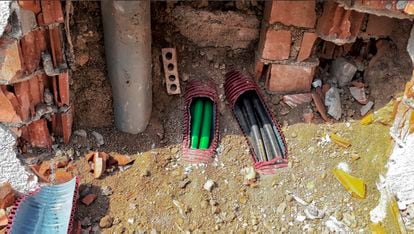Theft of electricity in an industrial warehouse in Santa Perpètua de Mogoda in which cryptocurrencies were mined.
/ ENDESA
The basement of a hotel, industrial warehouses, an annex to a rural house, stables, remote chalets or a flat on a tenth floor are some of the scenarios where Mossos d'Esquadra, local police, Civil Guard and National Police have located
farms
of cryptocurrencies in Spain.
Mining —extracting
through complex computer processes— these virtual currencies is not a crime, but tapping the light to reduce the costs represented by tens or hundreds of connected computers, processors and fans, is.
Although the quintessential thieves of electricity supply are the traffickers of the thousands of
indoor
marijuana plantations that are scattered throughout the territory, now they have been joined by
miners
.
Endesa has devised a technology that, by various parameters, makes it possible to know if there are drugs or virtual currency producers behind a punctured line.
In 2021 Endesa, which provides service to 95% of Catalonia, carried out, together with the police and under a court order, 700 interventions in which they found marijuana plantations that had the public network or the power line directly punctured.
The phantom
energy
, the one that they would have defrauded and was able to recover, is equal to that which a city like Palma de Mallorca spends annually.
In recent years, electricity fraud has grown considerably in Catalonia.
The 433,924,075 kWh defrauded last year compared to 234,889,690 kWh in 2019 give an idea of what is going on behind the lines.
Although the great electricity thieves are linked to marijuana, more and more cryptocurrency
farms
are being detected , of which there are hardly any records, and whose profitability is subject to reduced electricity prices.
There are more than 10,000 types of these currencies, although the best known are bitcoin and ethereum.
Cryptocurrency mining requires high performance equipment and specific
software
.
"It is evolving and is becoming more specialized," says the commander of the Criminal Cyber Intelligence Group of the Civil Guard, Alberto Redondo.
They cause an exorbitant consumption of electricity, “that is why it is more common in countries where it is very cheap, or disappointing,” he indicates.
The creation of these currencies depends on validating transactions between users in the community —they do the same thing— and receiving remuneration for it.
Theft of electricity in an industrial warehouse in Santa Perpètua de Mogoda in which cryptocurrencies were mined.
/ ENDESA
Endesa has launched a technology to detect this fraud and put a stop to it.
The company's Director of Distribution in Catalonia, Francesc Alemany, explains that they are applying technological advances to the lines and their systems.
“Depending on the quantity and the form of consumption, we have the calculation capacity to know if we are dealing with marijuana or cryptocurrency fraud.”
Alemany adds that the most common places where
farms
are detected are industrial estates, chalets or remote places.
According to the commander, "this type of facility is often used by criminal gangs for illicit activities related to drug trafficking, kidnapping, payment of assassins, a variety of scams and other technological crimes and money laundering."
And they entail a great and difficult challenge for the police units dedicated to pursuing this type of crime.
The Mossos d'Esquadra warned last year that the latest increases in the value of coins and their appearance in the media had "favored an increase in crimes related to this type of property."
The appearance of new scams has led to specific protocols for units specialized in cryptocurrency crimes.
Until now, all the findings of
farms
in which electricity was stolen have been "by chance", following the trail of plantations or in investigations initiated by detecting higher than normal electrical consumption and thermal emission.
There have been cases in Sant Adrià del Besos and Santa Perpètua de Mogoda (Barcelona), where in August 2018 there were shelves 40 meters long and four meters high full of devices.
To feed them, they buried an illegal double connection to the catenary of the street, a fact that shows a high level of professionalism, according to the police.
Cases have also been found in Catarroja (Valencia) —where Iberdrola quantified the fraud at around 20,000 euros— and in Crevillent (Alicante) —about 25,000 euros, according to the Electric Cooperative—, in Santiponce (Seville) and Yeles (Toledo).
A separate case was the 2018 discovery in Cambrils (Tarragona).
The Local Police suspected that some works in the Hotel Daurada Park could hide its conversion into a macrobrothel.
As they were banned from entering, they devised a works inspection order to gain access.
The
farm
was in the basement and consumed as a population of 6,500 inhabitants.
Exclusive content for subscribers
read without limits
subscribe
I'm already a subscriber

